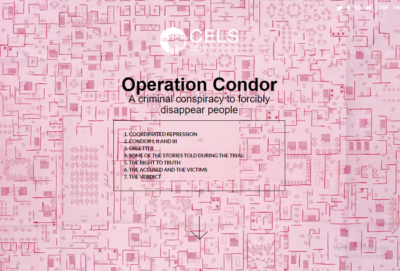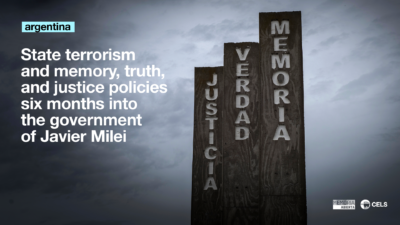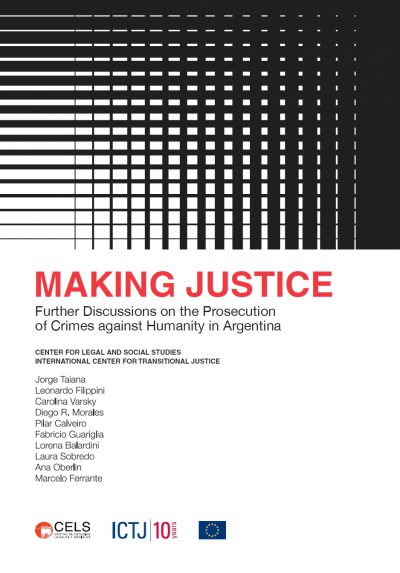Argentina must respond to the IACHR on the state of human rights
On Thursday November 14, Argentina will face three hearings where various social movements, human rights organizations and unions will present evidence of serious setbacks in public policies. The key issues raised will be memory, truth, and justice; prevention, punishment, and eradication of gender-based violence; and social and food policies.
We denounced the attack on memory policies before the United Nations
Human rights organizations held a meeting with the UN Working Group on Enforced Disappearances where we warned about this government’s regressive speech and measures against the policies of memory, truth and justice.
Canceled memory: the libertarian attempt to re-legitimize the dictatorship
Autor/a: CELS & Memoria Abierta
9 pages
ver más
State terrorism and memory, truth, and justice policies six months into the government of Javier Milei
Autor/a: CELS & Memoria Abierta
15 pages
ver más
Trelew massacre: Roberto Bravo’s extradition rejected
Criminal Cassation Court II reviewed a ruling from 2017 that had overlooked the complaints brought by Graciela García Romero, abducted and held in that clandestine detention center. The court subsequently convicted Jorge “Tigre” Acosta for the sexual abuse inflicted upon her. CELS has stood by Graciela’s pursuit of justice since 2005.
Conviction for sexual crimes committed at ESMA during the dictatorship
The Second Criminal Chamber of the Court of Appeals convicted Jorge “Tigre” Acosta for the sexual crimes committed against Graciela García Romero, who was kidnapped and held captive at the clandestine detention center known as ESMA. An earlier 2017 ruling had not taken into account her allegations. The Center for Legal and Social Studies (CELS) had supported Graciela’s pursuit of justice since 2005.
Sheraton case: a new trial begins
On November 25, the fourth stage of the trial began for crimes against humanity committed at the clandestine detention and torture center that operated out of the Villa Insuperable sub-station, Buenos Aires Province.
Roberto Bravo trial: day 5
On the last hearing, plaintiffs’ counsel and the defense presented their arguments. After 2.5 hours of deliberations, the jury returned a verdict finding Mr. Bravo liable on all charges and awarding $24.25 million in total damages.
Roberto Bravo trial: day 4
In this fourth hearing, a forensic physicist, a conscript and Raquel Camps, daughter of Alberto Camps, victim of the massacre, testified.
Roberto Bravo trial: day 3
Defendant Bravo resumed the stand for hours of questioning by his counsel, recalling that he began working at Almirante Zar Naval Base in January 1972. On August 15, 1972, the day of the Rawson Prison break, while on vacation with his family in Buenos Aires Mr. Bravo got a phone call ordering him back to base.
Roberto Bravo trial: day 2
The day concluded with the Defendant, Mr. Bravo, taking the stand for several hours. Certain details of Mr. Bravo’s testimony were not consistent with his prior sworn statements about the events at Trelew, including what soldiers were present, who opened the cell doors, how many shots were allegedly fired by a prisoner, and the position of each solider when the shooting commenced.
The trial of former marine Bravo began
The Florida State University College of Law International Human Rights Clinic monitored the trial of former Argentine naval officer, Defendant Roberto Guillermo Bravo, represented by Neal R. Sonnett, P.A. and Haber Law P.A., beginning June 27, 2022, and provides this neutral report of trial events.
Trelew massacre: after 50 years, the former marine Bravo will be tried in the United States
On June 27, the civil trial against Roberto Guillermo Bravo for his alleged responsibility in the executions will begin in Florida, United States.
Lawsuit Filed Against Former Naval Officer Accused of 1972 Massacre of Political Prisoners
Four of the victims’ families seek justice against Roberto Guillermo Bravo, who has avoided accountability for his alleged role in the Argentine massacre.
Mercedes-Benz: Kidnapping and torture to drown out workers’ demands
Seven company workers who were kidnapped in the 1970s – six of whom remain disappeared – and whose cases are analyzed in this trial were labor activists and delegates to the internal trade-union commission at Mercedes-Benz. CELS is acting as a plaintiff in its capacity as a human rights organization.
We seek to act as plaintiffs in the Acindar case
A plant owned by the Argentine steelmaker housed both a clandestine detention center and a police outpost during the 1976-1983 dictatorship. Company executives pointed out the workers who should be kidnapped and provided the military with photographs from their personal files so they could be identified.
The Ford case: prison terms of 10, 12 and 15 years
After 15 years of judicial investigations and a year-long trial, a federal court in Argentina found two former heads of Ford’s plant in General Pacheco guilty of acting as direct participants in illegal detentions and torture during the 1976-1983 dictatorship. This is a milestone in the sanctioning of civilian responsibility in state terrorism.
Supreme Court rules the “2 for 1” benefit is not applicable to crimes against humanity
The high court ruled on the case of Rufino Batalla, convicted to 13 years in prison for the kidnapping, torture and murder of Laura Carlotto and Olga Noemí Casado, and who had requested that the “2 for 1” sentence reduction provision be applied to his case. By determining it was inapplicable, the Supreme Court modified the criteria it had utilized in the Muiña ruling, which prompted widespread repudiation and led to the approval of a new law.
Crimes against humanity: Former police officers convicted of forcing Silvia Suppo to abort
Sentenced to prison terms between eight years and life, the former police officers were convicted for the crimes they committed against six activists in the city of Rafaela, province of Santa Fe. Silva Suppo, a survivor of state terrorism, was killed in 2010.
“Sheraton” trial: Our pleadings on behalf of Ana María Caruso and Roberto Carri
Ana María and Roberto were abducted in Morón, a suburb of Buenos Aires, and taken to the clandestine detention center known as the Sheraton or Embudo. For the couple’s kidnapping and torture, we ask that the court sentence the four defendants to 25 years in prison. At the trial, CELS represents their daughters, Andrea, Paula and Albertina Carri.
La Fronterita sugar company: six businessmen will be questioned over crimes against humanity
The public prosecutor’s office will question sugar industry executives from the province of Tucumán about their collaboration with the crimes committed against 68 people. Eleven of the victims remain disappeared.
“Argentina is responsible for widespread and persistent violations of the Convention against torture”
The UN Special Rapporteur on torture, upon concluding his visit to the country, said that detention conditions in provincial police stations and prisons “severely contravene international standards and are incompatible with human dignity.” He also denounced the “degrading” conditions in the Melchor Romero psychiatric hospital and police violence in low-income neighborhoods. At the same time, he urged the Argentine state to allocate “sufficient resources to ensure the timely processing and adjudication of the remaining cases and trials for crimes against humanity.”
We reject the attempt to benefit those convicted of crimes against humanity with house arrest on the pretext of prison overpopulation
Human rights organizations repudiate this maneuver that conceals another attempt to benefit the repressors. The Federal Penitentiary Service, which reports to the national Ministry of Justice and Human Rights, sent a list of 1,111 detained persons who, due to their time spent in prison, qualify for parole or house arrest with electronic monitoring. The document included 96 people convicted of crimes against humanity.
Peru: Fujimori’s pardon violates international and inter-American standards
FIDH, CELS and Abuelas de Plaza de Mayo present an amicus curiae brief before the Inter-American Court of Human Rights, demonstrating the incompatibility of the pardon granted to former Peruvian President Alberto Fujimori with international and inter-American human rights standards.
ESMA trial: The “death flights” were proven in court
After a trial lasting five years, the case known as ESMA III ended with 29 life imprisonment convictions, 19 sentences of between 8 and 25 years in prison, and 6 acquittals.
IACHR session: Memory, truth and justice, labor rights, Milagro Sala and Lhaka Honhat
Next week the Inter-American Commission on Human Rights (IACHR) will hold its 165th session in Montevideo. CELS will participate with other organizations in two public hearings and two work meetings with representatives of the IACHR and the Argentine state.
Civilian responsibility: First conviction of a businessman on crimes against humanity revoked
A federal appeals court overturned the convictions of businessman Marcos Levín and three police officers, disregarding the context of worker persecution that existed in the 1970s and was evident in the case of Levín’s company, La Veloz del Norte. It also failed to acknowledge civilian and corporate complicity with the dictatorship and questioned the numerous witnesses who told of Levín’s presence at the place where torture was carried out.
“ABO” detention centers: convictions requested for crimes against 352 people
The crimes attributed to the nine defendants were proven over the course of the trial, according to plaintiffs. For the first time, information was brought to light regarding the “transfer”-murder of 14 people held captive in this circuit of clandestine detention centers.
Four people convicted of crimes against humanity at Orletti detention center
More than 300 people were detained in the Automotores Orletti clandestine detention center, which functioned in a Buenos Aires mechanics’ shop in 1976. The majority were kidnapped as part of Operation Condor, a criminal conspiracy to persecute and disappear people across international borders.
The Supreme Court must say No to the “2 for 1” decision
Campaign by human rights organizations so that the Argentine Supreme Court issues a new ruling rolling back its decision that benefited perpetrators of crimes against humanity.
Automotores Orletti trial: pleadings come to a close with request for sentences
Today was the second and final hearing of the plaintiffs’ pleadings in the trial over crimes committed in the Orletti clandestine detention center. Two murders had never been brought to light during a trial before and, for the first time, these defendants are being held to account for their actions under state terrorism. We requested that three of them be sentenced to life in prison.
Banding together to defeat Argentina’s utterly unfit candidate to the IACHR
Published by openDemocracy, this opinion piece analyzes the joint work and individual strategies that different Argentine, regional and international organizations used to convince OAS member states to reject Argentina’s candidate to the IACHR, Carlos Horacio de Casas.
OAS must reject the Argentine candidate for the IACHR
The countries of the OAS must elect new commissioners to the IACHR. In February we formally objected to the Argentine state’s candidate. In addition, two ex-presidents of the IACHR, an international panel of independent experts and more than 60 scholars rejected his candidacy.
Argentines, again, resoundingly reject impunity for crimes against humanity
Some half a million people took to the streets in Buenos Aires alone to reject a Supreme Court decision aimed at dramatically reducing prison terms for perpetrators of crimes against humanity during the last dictatorship.
Corporate responsibility in crimes against humanity: Personal reflections
Victorio Paulón, a metalworker and union leader who was detained during Argentina’s 1976-1983 dictatorship, discusses judicial reluctance to prosecute corporate responsibility for the crimes against humanity committed under state terrorism.
ESMA: failure by justice system to make progress in proceedings for crimes against humanity
The court devotes little time to the hearings. In the final stage of the trial, unjustified motions for judges’ recusal are causing new delays. The past two years of the trial have been spent on the pleadings alone.
On the arrest of César Milani
While the arrest gives a sense of satisfaction to the victims and society, the lawsuits investigating Milani for crimes against humanity have been notable for their delays. This decision should have been reached long ago.
Business and human rights: Latin American contributions to debates on an international treaty
The United Nations intergovernmental working group in charge of designing the treaty met in Geneva.
A new trial against Automotores Orletti gets underway
Prosecution will continue over the crimes against humanity committed at Automotores Orletti, the clandestine detention center where many victims of Operation Condor were held illegally.
Trial for crimes committed in the Atlético-Banco-Olimpo detention centers begins tomorrow
This is the third trial for the crimes against humanity committed in the “ABO” circuit of clandestine detention centers, which were used for two years starting in early 1977.
The UN Human Rights Committee analyzed the state of civil and political rights in Argentina
Dialogue between the UN Human Rights Committee and the Argentine state regarding compliance with the International Covenant on Civil and Political Rights.
For the first time a court rules that Operation Condor was a criminal conspiracy
The existence of a formal system of repressive coordination between the dictatorships of Argentina, Bolivia, Brazil, Chile, Paraguay and Uruguay was proven in court.

ESMA: CELS requested prison terms for 55 defendants
CELS, on behalf of the unified legal team representing plaintiffs, requested life in prison for 51 defendants and 10-to-25-year prison terms for four others, in the third trial over the crimes against humanity committed at the ESMA torture and detention center.
New research: Business responsibility in crimes against humanity in Argentina
The report “Business responsibility in crimes against humanity: The repression of workers during state terrorism” presents evidence confirming that the owners, executives and managers of some companies actively participated in violating the human rights of workers during Argentina’s last dictatorship (1976-1983).
Making Justice: Further Discussions on the Prosecution of Crimes against Humanity in Argentina
Autor/a: Center for Legal and Social Studies (CELS) and International Center for Transitional Justice (ICTJ)
164 pgs.
ver más





